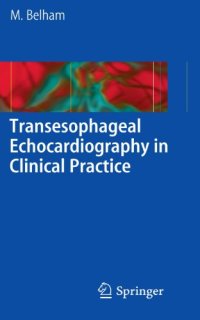
Ebook: Transesophageal Echocardiography in Clinical Practice
Author: Mark Belham (auth.)
- Tags: Cardiology, Anesthesiology, Imaging / Radiology, Intensive / Critical Care Medicine
- Year: 2009
- Publisher: Springer-Verlag London
- Edition: 1
- Language: English
- pdf
Over the last 30 years the technological advances in transesophageal echocardiography (TEE) have been exponential and have been reflected by its increasing utilization. Currently almost all echocardiography labs will undertake the modality and the vast majority of valve operations are performed with TEE guidance. The spatial and temporal resolution of TEE is unsurpassed and it is relatively easy to get good images with minimal training.
Transesophageal Echocardiography in Clinical Practice provides pragmatic guidance to those undertaking training in TEE. It is not an exhaustive text to be used for reference but one that should be used in conjunction with hands-on experience and, if used correctly, this combination will help the reader understand the true potential of TEE.
When imaging a patient’s heart the number of modalities available to choose from seems to be ever increasing and the clinician needs to be aware of the strengths and weaknesses of each modality in order to best answer the question posed. If more than one modality can answer the question then an appreciation of local expertise and patient preference is needed (although, in general, echocardiography can answer the question and should be the first line investigation). The first transesophageal echocardiogram (TEE) was performed in 1976 (M-mode only) and there were some who doubted that it would find a place in mainstream cardiac imaging. Over the last 30 years the technological advances in TEE have been exponential and have been reflected by its increasing utilization. Currently almost all echocardiography labs undertake TEE and the vast majority of valve operations are performed with TEE guidance. Those who are active in cardiac imaging know that the modality is unsurpassed because of its spatial and temporal resolution and that it is relatively easy to get good images with minimal training. These same practitioners will also be aware that, for these reasons, there are practitioners who bypass the appropriate training and use TEE as a very blunt diagnostic tool. The purpose of this book is thus to give practical guidance to those undertaking training in the art of TEE. It is not an exhaustive text to be used for reference but one that should be used in conjunction with hands-on experience. If used correctly it will help in realizing the true potential of TEE.